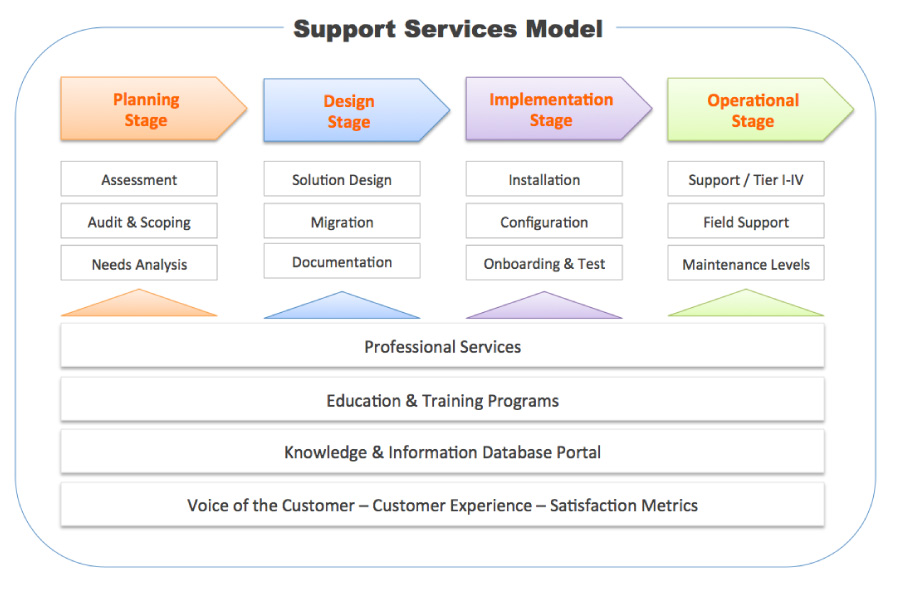Creating programs that help drive operational efficiency and enhanced revenue opportunities.
Support Services - Every company reaches a stage when service will play an important and integral role in achieving greater success. In the early stages, providing basic first tier support, along with basic pre and post sales activities, is enough to satisfy most initial customer requirements. But as your customer base grows, your customers will expect a richer portfolio of service offerings to meet their advanced requirements. At this stage, an expansion of support service offerings also becomes a valuable revenue stream when executed properly.

Support Services programs that align to functional customer requirements:
- Planning Stage - assist in determining customer needs [assessment, audit, analyze]
- Design Stage - ensure the correct type and quantity of products are selected
- Implementation Stage - deployment of products and technology [installation, testing, optimization]
- Operational Stage - assist in technical support, maintenance, troubleshooting, call management
Program Creation Methodology
At Dartmouth Data, we engage in a 7-step development process to create meaningful new programs for our clients. It is important to conduct deep dive discussions with key stakeholders to fully realize a program's capability, interaction, integration, and potential customer impact. With proper detailed planning and vetting, the chances of a successful program launch and goal achievement is increased significantly.

PLANNING - The process begins with initial concept planning of the proposed program to help fully understand the scope and potential impact to the business. In this stage we review alignment to the overall services product portfolio, relationship to supportability of company product line, and value that will be realized by the customer.
ANALYSIS - We determine how the proposed service program compares to the overall competitive landscape, conduct industry research and analysis of similar service programs, and analyze the desired features and benefits of the offering being considered. The goal is to understand the scope and positioning prior to development.
FORECAST - A financial model will be created to forecast the financial variables related to cost versus return on the investment. A full financial breakdown of development, implementation, and training costs will be explored.
DEVELOPMENT - Once the service program is given the green light by all key stakeholders, the development phase begins. This includes creation of content, workflow process and flowcharts, training materials, and other supporting information that may be required.
IMPLEMENTATION - A successful launch of the program is critical to success. The new service program needs to be embraced throughout the company; from senior management, sales, product management, marketing and support. There are defined steps to ensure the program can be fully implemented as a standard practice throughout the organization.
ENGAGEMENT - Engagement metrics need to be defined, collected, and analyzed to ensure the program is achieving the defined goals and desired outcomes. This includes verifying effectiveness of the sales materials in use, determining if the training was sufficient, measuring customer acceptance, financial impact, etc.
EVALUATION - Conducting ongoing evaluation of success metrics are an important part of ensuring the program meets the needs the company´s expected goals. Collecting support, sales and customer feedback is important to make continuous improvements and modifications to the program. Using follow-up customer surveys, Net Promoter Score (NPS), and direct customer feedback are all great methods of collecting useful information.
Support Services programs closely align to the following job categories:
- Phone Support (Tier I, II, III)
- Product Support Engineering (Tier IV)
- Pre/Post Sales Field Support - Pre/Post
- Education and Training
- Professional Services
- Voice of the Customer
- Escalation Manager
- Customer Success Manager
- Customer Experience Manager